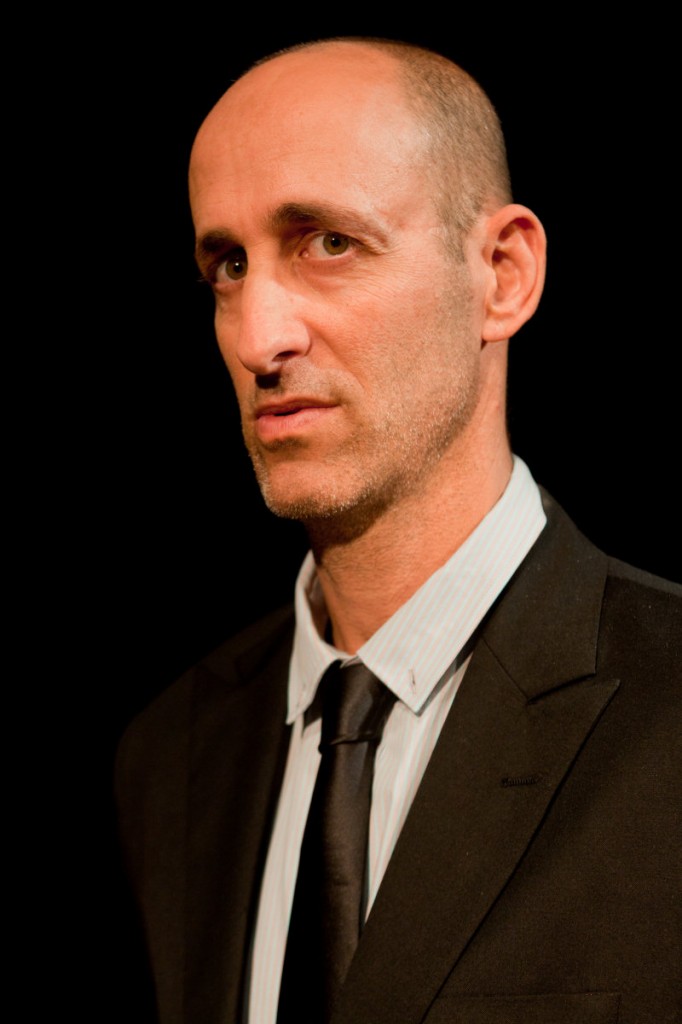A tall thin man with glasses, formally dressed in suit and tie, enters the room. He tells a story in the manner of one who knows that his audience is familiar with the facts of his tale, often prefacing his remarks with the words: “You know.” He says “you know,” then pauses, and repeats slowly, “you know.” I do know this story. I have heard it many times before, and I am hearing it now for the first time.
The Khan Theatre is currently presenting Primo Levi’s If This is a Man (originally published in Italian under the title Se questo è un uomo, in the United States translated as Survival in Auschwitz)a monodrama adapted and directed by Mor Frank, performed by Nir Ron.

Levi says, in the preface to book, “this book of mine adds nothing to what is already known to readers…on the disturbing questions of the death camps,” asking in the poem that opens the text: “Consider if this is a man…Consider if this is a woman.” Levi’s fragmented, poetic text and precise descriptions of his experience in the camps are a timeless reflection on what it means to be human. In the theatre it is not enough to ask a question, or build a thesis with layer upon layer of words; one must create a visual, physical, emotional experience. A text cannot be transposed to the theatre, it must be transformed: Mor Frank and Nir Ron have created a theatrical work distilled to its essential elements, moving between knowing and asking, feeling what it means to be human, how it might feel to have that sense of humanity taken away.
The intimacy of the Khan theatre, its stone walls and a bare stage form the backdrop for this performance. The absence of a set and minimalist touches of lighting and music take this production to the brink of abstraction and at the same time invoke a sense of the sacred. Frank’s artistic adaptation concentrates Levi’s text, emphasizing the theme, while her use of repetition is at once conversational and poetic. Listening to the play one feels that Primo Levi himself is speaking, a tribute to Frank’s attentiveness to the text, skillful editing and adaptation.
Ron brings an immense reservoir of empathy to this role, speaking directly to the audience, as the storyteller of the tribe would speak to the community gathered around the fire at night, passing on the knowledge of generations. Moving in and out of character with nuanced precision, with only his presence and voice as instruments, he is our guide through this hell. A change of pace or intonation, a glance, the way he holds and moves his body at different moments in the course of the story – using these simple means Ron delivers a performance that is simply captivating and deeply moving.
When I returned home after the performance, I returned to Levi’s book, compelled to reread. I have been carrying the book, and the memory of this performance with me for the past few days. As time pulls us inexorably farther away from the Holocaust, those who survived will soon no longer be among us. For the generations to come knowledge and memory will be a choice; and while history books may provide knowledge of the facts, it will only be through art that one can experience the feelings. Regardless of our family background or ethnic origins, this is a story of our shared collective memory – Mor Frank and Nir Ron bring it close to our hearts, bring us closer to our sense of humanity.
“Part of our existence lies in the feelings of those near to us.”
Primo Levi, Survival in Auschwitz
Se questo è un uomo
Written by Primo Levi
A monodrama performed by Nir Ron
Adaptation and directing: Mor Frank
Hebrew: Isaac Garty
Lighting Design: Judy Kupferman
Music: Roy Yarkoni
Assistant Director: Noam Peleg
Future performances dates: November 2, 3, & 5, 2011; January 4, 5, & 7, 2012. Consult the Khan Theatre website for more information.






Dear Ayaket Dekel, I am deeply impressed. Your review faithfully reflects my feelings too; perhaps, better expressed. God bless you, Eli Rozik
Comments are closed.